Many individuals who are trying to conceive are often eager to find out if they are pregnant as soon as possible. After ovulation, a crucial phase in the menstrual cycle where the egg is released from the ovary, the body undergoes changes to prepare for a potential pregnancy. If fertilization occurs, the embryo travels to the uterus and implants into the uterine lining, which triggers the production of the pregnancy hormone hCG (human chorionic gonadotropin).
Following ovulation, it typically takes around 6 to 12 days for the fertilized egg to implant in the uterus. Once implantation occurs, the developing placenta begins to release hCG into the bloodstream. The levels of hCG in a pregnant person’s body start to increase rapidly in the early stages of pregnancy, doubling approximately every 48 to 72 hours.
Home pregnancy tests work by detecting the presence of hCG in urine. Generally, most home pregnancy tests claim to provide accurate results as early as the first day of a missed period. However, it is important to note that the timing of when a pregnancy test can show positive results after ovulation can vary depending on the individual’s hCG levels and the sensitivity of the test.
For individuals who are closely tracking their ovulation and have a regular menstrual cycle, it is possible to test for pregnancy earlier than waiting for a missed period. As mentioned before, hCG levels can start to appear in urine around 7 to 9 days after ovulation if implantation is successful. While some early detection pregnancy tests claim to detect hCG levels even before a missed period, it is recommended to confirm these results with a healthcare provider.
Factors such as the timing of implantation, individual hCG production rates, and the sensitivity of the pregnancy test can influence when a pregnancy test will show positive results after ovulation. It is essential to follow the instructions provided with the home pregnancy test carefully and consult a healthcare professional if there are any concerns regarding the results.
Additionally, false-negative results can occur if the test is taken too early, prior to the hCG levels being detectable by the test. In such cases, it is advisable to wait a few days and retest if a negative result is obtained, especially if pregnancy symptoms persist.
Understanding the biological processes that occur after ovulation and implantation can help individuals manage their expectations when awaiting the results of a pregnancy test. While some may experience early symptoms of pregnancy, such as breast tenderness, fatigue, or nausea, it is important to remember that hCG levels may not be detectable by a home pregnancy test until a sufficient amount of the hormone has been produced in the body.
Overall, the timing of when a pregnancy test can show positive results after ovulation can vary, but it is generally recommended to wait until after a missed period for the most accurate results. However, for those who are eager to test early, understanding the factors that influence hCG production and test sensitivity can help manage expectations and guide decision-making regarding testing for pregnancy.

